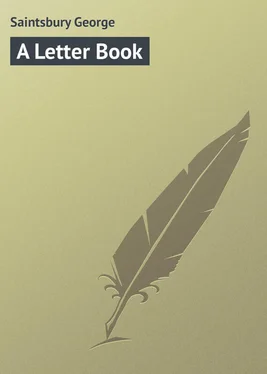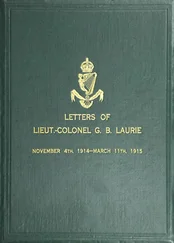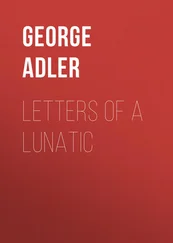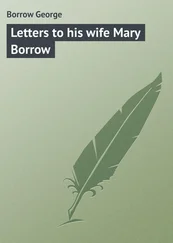George Saintsbury - A Letter Book
Здесь есть возможность читать онлайн «George Saintsbury - A Letter Book» — ознакомительный отрывок электронной книги совершенно бесплатно, а после прочтения отрывка купить полную версию. В некоторых случаях можно слушать аудио, скачать через торрент в формате fb2 и присутствует краткое содержание. ISBN: , Жанр: foreign_language, foreign_prose, на английском языке. Описание произведения, (предисловие) а так же отзывы посетителей доступны на портале библиотеки ЛибКат.
- Название:A Letter Book
- Автор:
- Жанр:
- Год:неизвестен
- ISBN:http://www.gutenberg.org/ebooks/31072
- Рейтинг книги:3 / 5. Голосов: 1
-
Избранное:Добавить в избранное
- Отзывы:
-
Ваша оценка:
- 60
- 1
- 2
- 3
- 4
- 5
A Letter Book: краткое содержание, описание и аннотация
Предлагаем к чтению аннотацию, описание, краткое содержание или предисловие (зависит от того, что написал сам автор книги «A Letter Book»). Если вы не нашли необходимую информацию о книге — напишите в комментариях, мы постараемся отыскать её.
A Letter Book — читать онлайн ознакомительный отрывок
Ниже представлен текст книги, разбитый по страницам. Система сохранения места последней прочитанной страницы, позволяет с удобством читать онлайн бесплатно книгу «A Letter Book», без необходимости каждый раз заново искать на чём Вы остановились. Поставьте закладку, и сможете в любой момент перейти на страницу, на которой закончили чтение.
Интервал:
Закладка:
On the probable general fact, however, some observations may be less frivolously based. If this were a sentimental age, as some ages in the past have been, one might assume that, as the first portrait is supposed to have been a silhouette of the present beloved, drawn on her shadow with a charcoaled stick, so the same, or another implement may have served (on what substitute for paper anybody pleases) to communicate with her when absent. But the silliness of this age – though far be it from us to dispute its possession of so prevailing a quality – does not take the form – at least this form – of sentiment.
There is, moreover, nothing silly or sentimental, though of course there is something that may be controverted, in saying that except for purely "business" purposes (which are as such alien from Art and have nothing to do with any but a part, and a rather sophisticated part, of Nature) the less the letter-writer forgets that he is merely substituting pen for tongue the better. Of course, the instruments and the circumstances being different, the methods and canons of the proceedings will be different too. In the letter there is no interlocutor; and there is no possibility of what we may call accompanying it with personal illustrations 1 1 It may of course be "illustrated" in the other sense by a second use of the pen; and we shall have instances of this kind to notice.
and demonstrations, if necessary or agreeable. But still it may be laid down, with some confidence, that the more the spoken word is heard in a letter the better, and the less that word is heard – the more it gives way to "book" – talk – the worse. Indeed this is not likely to be denied, though there remain as usual almost infinite possibilities of differences in personal opinion as to what constitutes the desirable mixture of variation and similarity between a conversation and a letter. Let us, before discussing this or saying anything more about the principles, say something about the history of this, at best so delightful, at worst so undelightful art. For if History, in the transferred sense of particular books called "histories," is rather apt to be false: nothing but History in the wider and higher sense will ever lead us to truth. The Future is unknown and unknowable. The Present is turning to Past even as we are trying to know it. Only the Past itself abides our knowledge.
Of the oldest existing examples of epistolary correspondence, except those contained in the Bible, the present writer knows little or nothing. For, except a vanished smattering of Hebrew, he "has" no Oriental tongue; he has never been much addicted to reading translations, and even if he had been so has had little occasion to draw him to such studies, and much to draw him away from them. There certainly appear to be some beautiful specimens of the more passionate letter writing in ancient if not exactly pre-Christian Chinese, and probably in other tongues – but it is ill talking of what one does not know. In the Scriptures themselves letters do not come early, and the "token" period probably lasted long. Isaac does not even send a token with Jacob to validate his suit for a daughter of Laban. But one would have enjoyed a letter from Ishmael to his half-brother, when his daughter was married to Esau, who was so much more like a son of Ishmael himself than of the amiable husband of Rebekah. She, by the way, had herself been fetched in an equally unlettered transaction. It would of course be impossible, and might be regarded as improper, to devote much space here to the sacred epistolographers. But one may wonder whether many people have appreciated the humour of the two epistles of the great King Ahasuerus-Artaxerxes, the first commanding and the second countermanding the massacre of the Jews – epistles contained in the Septuagint "Rest of the Book of Esther" (see our Apocrypha), instead of the mere dry summaries which had sufficed for "the Hebrew and the Chaldee." The exact authenticity of these fuller texts is a matter of no importance, but their substance, whether it was the work of a Persian civil servant or of a Greek-Jew rhetorician, is most curious. Whosoever it was, he knew King's Speeches and communications from "My lords" and such like things, very well indeed; and the contrast of the mention in the first letter of "Aman who excelled in wisdom among us and was approved for his constant good will and steadfast fidelity" with "the wicked wretch Aman – a stranger received of us … his falsehood and cunning" – the whole of both letters being carefully attuned to the respective key-notes – is worthy of any one of the best ironists from Aristophanes to the late Mr. Traill.
Between these two extremes of the Pentateuch and the Apocrypha there is, as has been remarked by divers commentators, not much about letters in the Bible. It is not auspicious that among the exceptions come David's letter commanding the betrayal of Uriah, and a little later Jezebel's similar prescription for the judicial murder of Naboth. There is, however, some hint of that curious attractiveness which some have seen in "the King's daughter all glorious within – " and without (as the Higher Criticism interprets the Forty-Fifth Psalm) in the bland way with which she herself stipulates that the false witnesses shall be "sons of Belial."
There is a book (once much utilised as a school prize) entitled The History of Inventions . I do not know whether there is a "Dictionary of Attributed Inventors." If there were it would contain some queer examples. One of the queerest is fathered (for we only have it at second hand) on Hellanicus, a Greek writer of respectable antiquity – the Peloponnesian war-time – and respectable repute for book-making in history, chronology, etc. It attributes the invention of letters — i. e. "epistolary correspondence" – to Atossa – not Mr. Matthew Arnold's Persian cat but – the Persian Queen, daughter of Cyrus, wife of Cambyses and Darius, mother of Xerxes, and in more than her queenly status a sister to Jezebel. Atossa had not a wholly amiable reputation, but she was assuredly no fool: and if, to borrow a famous phrase, it had been necessary to invent letters, there is no known reason why she might not have done it. But it is perfectly certain that she did not, and no one who combines, as all true scholars should endeavour to combine, an unquenchable curiosity to know what can be known and is worth knowing with a placid resignation to ignorance of what cannot be known and would not be worth knowing – need in the least regret the fact that we do not know who did.
There are said to be Egyptian letters of immense antiquity and high development; but once more, I do not profess direct knowledge of them, and once more I hold that of what a man does not possess direct knowledge, of that he should not write. Besides, for practical purposes, all our literature begins with Greek: so to Greek let us turn. We have a fair bulk of letters in that language. Hercher's Epistolographi Graeci is a big volume, and would not be a small one, if you cut out the Latin translations. But it is unfortunate that nearly the whole, like the majority of later Greek literature, is the work of that special class called rhetoricians – a class for which, though our term "book-makers" may be a little too derogatory, "men of letters" is rarely (it is sometimes) applicable, as we use it when we mean to be complimentary. These letters are still close to "speech," thus meeting in a fashion our initial requirement, but they are close to the speech of the "orator" – of the sophisticated speaker to the public – not to that of genuine conversation. In fact in some cases it would require only the very slightest change to make those exercitations of the rhetors which are not called "epistles" definite letters in form, while some of the best known and characteristic of their works are so entitled.
Читать дальшеИнтервал:
Закладка:
Похожие книги на «A Letter Book»
Представляем Вашему вниманию похожие книги на «A Letter Book» списком для выбора. Мы отобрали схожую по названию и смыслу литературу в надежде предоставить читателям больше вариантов отыскать новые, интересные, ещё непрочитанные произведения.
Обсуждение, отзывы о книге «A Letter Book» и просто собственные мнения читателей. Оставьте ваши комментарии, напишите, что Вы думаете о произведении, его смысле или главных героях. Укажите что конкретно понравилось, а что нет, и почему Вы так считаете.












